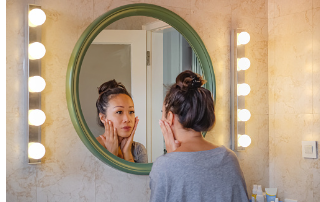Remember when you were little, and you had an idea of your future life? You probably thought that at some point, you would have it all figured out. You would have an existence and routine you were confident in, and then you’d be set. You’d be done growing and simply ride the rest of your life with “all the answers.” What a wake-up call adulthood can be!
The truth is that we never stop learning or growing. Sure, we aren’t learning the same foundational survival skills we learned as little ones, but there is always room to continue to

improve our faith in ourselves. Every time we try something new or make a life change, we rely on ourselves to adapt and learn. These challenges and transitions can cause anxiety and worry, even if the changes are positive overall. We may struggle to come to terms with the task at hand if we are mired in insecurity or don’t have the tools to talk ourselves through the situation. These are the times when that inner confidence and self-trust that we just assumed we’d have plenty of as kids feel a million years away.
Problems with self-trust arise when we were never shown or taught how to be self-confident or when events and circumstances have caused our confidence to take a hit. We begin to make decisions based on fear rather than on what we truly want. We live a life of attempting to prevent the bad rather than pursuing the good. When we don’t trust ourselves, we experience increased anxiety, worry, and distress when making decisions and/or living with their consequences.
What causes a lack of trust?:
- Self-doubt and insecurities:

Lack of self-trust is the cause and the symptoms of self-doubt. When we don’t trust ourselves, we experience low self-esteem, and when we experience low self-esteem, we don’t trust ourselves. We may not have been encouraged to take risks as children, or we may have been raised by a caregiver who made us feel bad about ourselves when we tried something and failed. The voice in our head becomes critical and undermines us when we think about setting goals,
creating a suitable routine, or trying new things.
Insecurities can come from anywhere: an offhand comment someone made once, a series of life experiences; an anxious attachment style, and the list goes on. These insecurities chip away at our confidence. When we aren’t confident in ourselves, we think the worst: people don’t like us; we aren’t qualified for that job; we’ll never find another partner if we leave this one; we shouldn’t try that new sport because we’ll be bad at it. Whatever the focus or issue may be, it becomes a self-fulfilling prophecy as we make poor attempts at things or don’t attempt them at all.
2.Negative thinking:
Getting locked into negative thinking is dangerous because our thoughts become our actions. When we are in a negative headspace, we are more likely to make

mistakes or to miss opportunities for success. Negative thinking puts us in a triage stage mentally, where we are dealing with incoming information as if it could make the difference between whether we are safe or not. In this state of mind, we see only threats. Because we cannot see positives, we become convinced that our negative thinking is valid and acquire more and more data that supports that idea.
If we spend long enough in a negative headspace or endure a series of unfortunate mishaps, accidents, or errors, we may fall into the habit of catastrophizing our daily lives. Catastrophizing is a cognitive distortion that makes us only able to imagine negative outcomes in any given situation. We no longer imagine how it would look if we were to succeed, but rather, all of the possible ways things could go wrong. This completely undermines the trust we have in ourselves and society. Anxiety can become a constant companion, heightening our fears and making it hard to think positively. Therapy for anxiety in Woodland Hills can help you discover and utilize tools for dealing with these thoughts and feelings.
3.Life events:

Unfortunately, we all endure life events beyond our control and those heartbreaks we as human beings experience. Difficult, discouraging, and traumatic life experiences can become “facts” that we will not be successful in life. Sometimes, these experiences happen when we are very young: losing a trusted caregiver may have undermined our sense of safety and justice in the world. Abuse and/or neglect by someone we trusted might have impacted our self-esteem or created a conflict within about what
our worth was. Sometimes, our parents moved us around a lot, and we never had time to make friends; as adults, we may have the impression that we cannot. Getting fired from a job that we loved or a relationship we had invested in breaking up might also create questions we have about our abilities, our intuition, or our value to others. All of these events and more can cause us to question ourselves.
Following challenging experiences, or after a particularly long amount of time feeling insecure, you may find yourself wondering, “How can I learn to trust myself again?” It may feel impossible, and you may find yourself tempted to spiral into negative thinking about your prognosis. Maybe you feel burned by the last time you trusted your gut – or thought you were trusting your gut – or maybe you simply don’t have the confidence to lean on yourself that way. Everyone has strong self-trust days and less-strong ones. Everyone who needs to build a sense of self-trust starts somewhere. There is no reason you can’t also take steps toward letting go of insecurities and embracing your power.
It is all well and good for someone to sit back and tell you to “Just be confident” or “Just trust yourself,” but sometimes that doesn’t help you find a place to begin. If you’ve ever thought, “I would love to let go of this fear, but I don’t know how to learn to trust myself,” there is a starting point for you. The first step is to remember that no learning process will be perfect and that all new habits take time and consistency.
How to cultivate self-trust in three easy steps:
- Befriend your self-doubt:
Your insecurities don’t have to be your enemy. You might think, “Confident people don’t feel insecure.” But that’s not true. All of us have insecurities, anxieties, and fears. The goal

is to learn to live with them. Learning to embrace your insecurities means having healthy boundaries with them. You shouldn’t ignore your insecurities; they might be warning you of areas that you need to improve on. But you also shouldn’t put your insecurities in the driver’s seat, as they are not always telling you the truth.
One way to befriend your self-doubt is to use your worries and insecurities as a guidebook of what to explore about yourself. In this way, you can create positive learning opportunities out of what previously created disharmony in your life. For example, if you would like to join a club or league, but you worry that others won’t like you or you don’t have the skills, that feeling is an opportunity to push yourself. Explore why you feel the way you feel and how you can prove your doubts wrong.
If your worry is that people won’t like you, the only way to prove yourself wrong is to go out and meet them. If this is a long-standing concern, you may want to explore its origins in a safe and neutral environment, such as therapy. We offer therapy for self-confidence in Woodland Hills, in which we identify and disempower self-doubt and anxiety. If your worry is that you don’t have the skills (say you want to join a bowling league), why not use that concern as a motivator to go bowling and practice? Overcoming your self-doubts by participating despite them boils down to some of my favorite advice: feel the fear and do it anyway.
2.Celebrate small wins:

Learning how to trust yourself more comes from celebrating small victories as well as big ones, and here’s why: you are far more likely to have small victories, and you are far more likely to have them more frequently than big ones. Waiting until you achieve something “huge” is a surefire way to create anxiety and pressure when working on bigger projects and to feel very disappointed if they don’t work out. (It also takes all the enjoyment out of working on something if you think nothing you are doing matters.)
By celebrating small wins, you facilitate your ability to see all the positive aspects of your life, your work, and yourself. As time goes by, the hundreds of sparks created by acknowledging your successes illuminate all the great things you have in your life and all that you have achieved. A retrospective of the last week,
month, or year becomes a highlight reel of these victories; remembering the time that has passed feels positive. Being in a headspace of positivity and pride breeds confidence and contentment. It becomes easier to let mistakes go because we recognize that they are a small piece of the puzzle.
Think of how you want to recognize and celebrate your small wins. You can keep a list in a journal or blog. You can create an account on a social media platform that captures images of goals achieved. You can create a poster board and use stickers or make a collage. You can put a marble in a jar every time you feel you have achieved something. You can take time to meditate and focus on your successes every day. Whatever routine you want to get into to track your successful endeavors.
Consider what you think is a successful endeavor. It could be personal or professional. Where can you find opportunities to achieve tasks and goals? Once you have, how will you celebrate? We can celebrate with quality alone time, like a bubble bath. We can celebrate with a happy dance alone in our living rooms. Those shoes we’ve been eyeing. Investing in a new course or class. Celebrating doesn’t have to take a lot of time or cost a lot of money, but it can! It’s all up to you. What matters is that you take the time to acknowledge your success in a way that works for your life and priorities.
- Embrace imperfections and make mistakes:
People who trust themselves don’t do so because they’ve never made a mistake. They do so because they know that, no matter what happens, they will get through it. A great way to nurture that feeling is to try new things and

facilitate opportunities for yourself to do things poorly. There is no way to get used to making mistakes without making them.
Two things really help to reduce our fear of making mistakes: acceptance and accountability. Have you ever seen someone make a silly mistake and then laugh about it? That person has acceptance. That person is not stuck in the past and wishes they hadn’t made a mistake. That person accepts that the mistake happened, that it was small, and no one got hurt. They might be a little embarrassed, but it’s not the end of the world for them. They may think, “That was a good learning experience for me,” or “Everyone makes mistakes sometimes.”
Those who take accountability are also good at embracing imperfections. These are the people who are quick to apologize if they cross a line or say something thoughtlessly. They take responsibility for their mistakes and own up to them. This is not always easy to do because it can hurt our pride to admit that we were wrong. But once we become good at being responsible for ourselves in this way, we can release a lot of fear about making mistakes because we know that we are able to do what is right if we make a mistake. This doesn’t mean we are reckless with our words and actions, but rather that we are confident in our intention to do well and able to own up to it when we make a misstep.
Self-doubts are tricky; sometimes, we feel very overwhelmed by them, and other times we forget they’re there. The important thing is to believe that you can solve issues when they arise. Where we come across self-doubt, we often find opportunities to get to know ourselves better or heal a part of our past. These insecurities and struggles can also help us understand and forgive those around us who may have harmed us when they felt similarly to how we feel now. Having empathy and forgiveness for others (within reason) can provide us with peace of mind and contentment as we let go of carrying our resentment toward them. When we explore our self-doubt, we also learn to forgive and heal ourselves.
Other Services at Embracing You Therapy
Here at Embracing You Therapy, we invite you to explore with us how life would be different if you had more control over your thoughts and emotions, and we invite you to consider that it is possible to accept things just as they are, embracing imperfections to create a gentler place for calm in your life.
Let’s learn what drives your unique perspective on anxiety and stress. Then, let’s find the tools-your unique tools-that help you respond to life in a healthy, calm way. Contact us today for your complimentary 15-minute phone consultation with one of our Client Care Coordinators.




